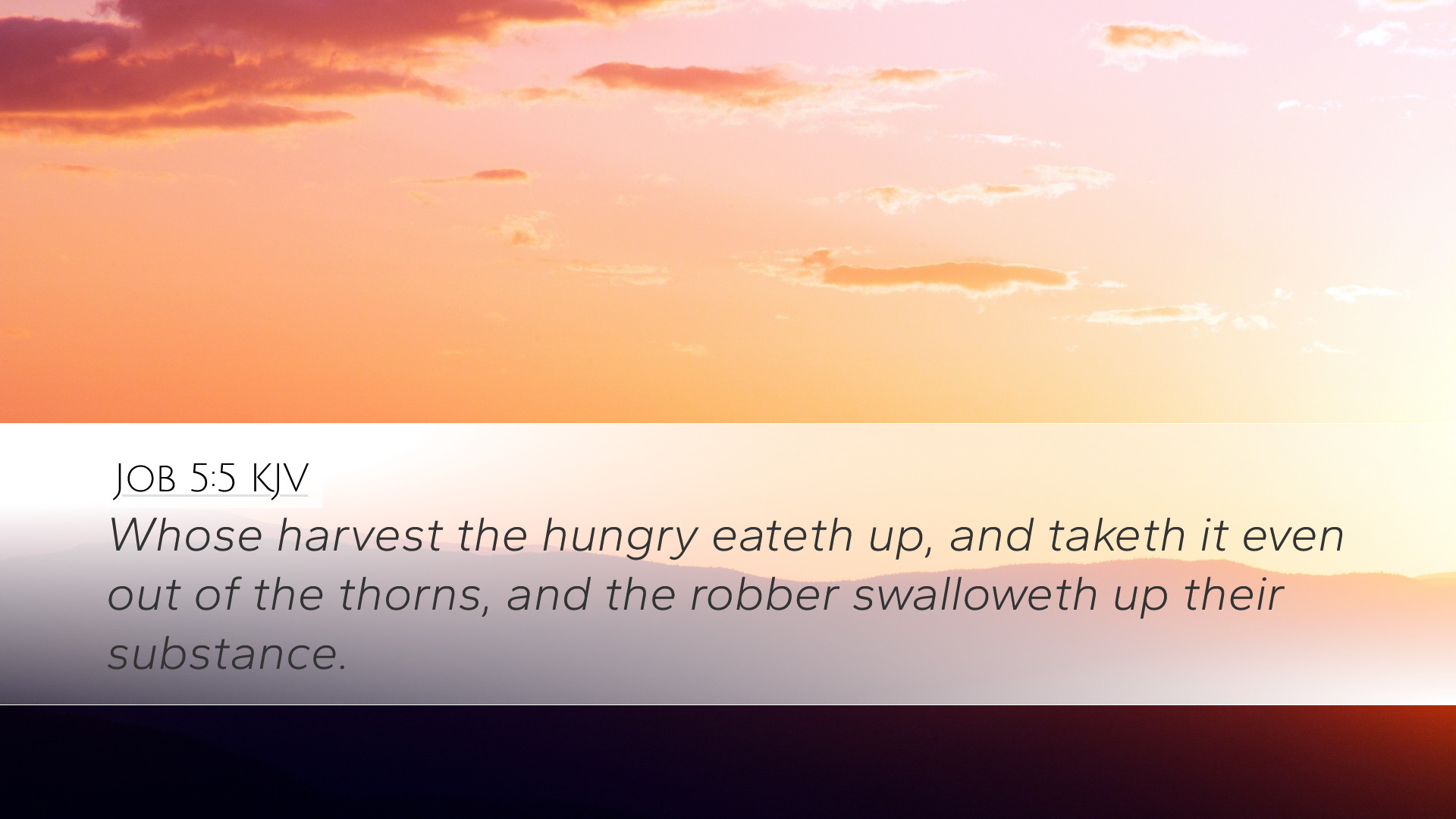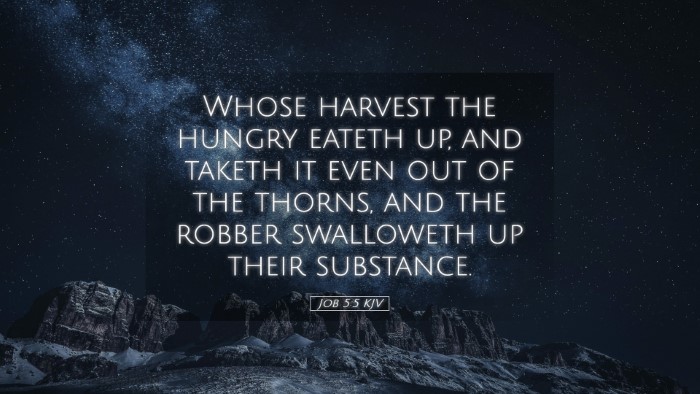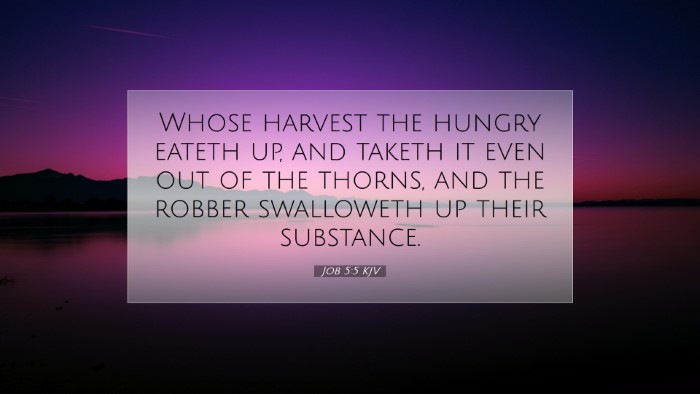Old Testament
Genesis Exodus Leviticus Numbers Deuteronomy Joshua Judges Ruth 1 Samuel 2 Samuel 1 Kings 2 Kings 1 Chronicles 2 Chronicles Ezra Nehemiah Esther Job Psalms Proverbs Ecclesiastes Song of Solomon Isaiah Jeremiah Lamentations Ezekiel Daniel Hosea Joel Amos Obadiah Jonah Micah Nahum Habakkuk Zephaniah Haggai Zechariah MalachiJob 5:5
Job 5:5 KJV
Whose harvest the hungry eateth up, and taketh it even out of the thorns, and the robber swalloweth up their substance.
Job 5:5 Bible Commentary
Commentary on Job 5:5
Job 5:5 (KJV): "His harvest the hungry eateth up, and taketh it even out of the thorns; and the robber swalloweth up their substance."
This verse occurs within a broader discourse by Eliphaz the Temanite, who attempts to address Job's suffering. In examining this passage, we draw from the insights of several public domain commentaries to explore its theological implications, literary context, and practical applications.
Contextual Overview
Job 5 is part of a series of speeches where Eliphaz, one of Job’s friends, seeks to offer wisdom regarding divine justice and the nature of human suffering. This chapter emphasizes God's sovereignty and the idea that suffering can serve a divine purpose.
Thematic Analysis
The themes explored in this passage include the unpredictability of life's trials, the nature of divine justice, and the moral order of the universe. Eliphaz suggests that calamity often befalls those who are wicked and that suffering, including that which Job endures, serves as a corrective measure by God.
Insights from Commentaries
-
Matthew Henry:
Henry views this verse as an illustration of the plight of the wicked and the ease with which they can lose their possessions. He emphasizes the idea that divine justice can intervene in ways that subvert human expectations. The "hungry" who consume the harvest symbolize the needy or the oppressors who take advantage of others. This serves as a reminder of the transient nature of earthly rewards.
-
Albert Barnes:
Barnes offers an interpretation that aligns the imagery of the "robber" with the idea of moral decay. He points out that Eliphaz is suggesting that those who are wicked not only face divine justice but also experience societal consequences. He notes that the "thorns" in this verse may symbolize the obstacles that impede righteousness, reflecting the inevitable hardship that follows moral failure. Barnes urges readers to discern the spiritual lesson on reliance upon God amidst adversity.
-
Adam Clarke:
Clarke expands upon the metaphor of harvesting and the idea of thorns, arguing that they represent the troubles that accompany a life of sin. He interprets the "hungry" as souls starved by iniquity—living in desperation for truth and righteousness. He also highlights the "robber" as a symbol of the inevitable demise that befalls unjust individuals, which resonates with Clarke’s broader theological perspective on justice and retribution in the divine economy.
Theological Reflections
The assertions made about the helplessness of the wicked and the ultimate triumph of divine justice raise significant questions about the nature of God’s governance over creation. Eliphaz's speech, while offering some truth, also runs the risk of oversimplifying Job’s situation and the complexities of suffering. It provides an opportunity for pastors and theologians to explore the tensions between retributive justice and the mystery of undeserved suffering.
Lessons for Pastoral Care and Ministry
In pastoral situations, the insights from Job 5:5 can be pivotal for counseling individuals grappling with injustice or feeling cornered by life's challenges:
-
Understanding Suffering:
The passage serves as a crucial reminder that suffering is not always indicative of divine punishment. In ministry, it is vital to communicate the complexities of life and suffering without resorting to clichés.
-
Encouragement through Tribulation:
Eliphaz's message about the divine purpose behind suffering can offer hope. Pastors can assure congregants that God is aware of their struggles and may be using their hardships for a greater purpose.
-
Focus on Justice:
In a world filled with injustice, the illustrations of divine retribution in this verse can prompt discussions about social justice, encouraging congregations to advocate for those who are oppressed.
Application to Our Lives
As we reflect on Job 5:5, we are invited to examine our responses to suffering, our perceptions of justice, and our reliance on God. This passage compels us to:
-
Seek Understanding:
Engage deeply with scripture and tradition to unpack the themes of suffering and holiness diligence, especially in moments of personal hardship.
-
Extend Compassion:
Like the "hungry," we must remain sensitive to the needs of those who suffer injustice and provide support, whether through tangible help or emotional solidarity.
-
Trust in Divine Justice:
Trust that God’s justice may not always align with human timelines or expectations. Faith encourages us to look forward to the ultimate restoration promised in biblical eschatology.
Conclusion
Job 5:5 encapsulates profound truths about divine justice, the recurrence of suffering, and the moral fabric that governs human interactions. Through rich commentary from Matthew Henry, Albert Barnes, and Adam Clarke, we gain insight into these enduring themes. As we navigate our understanding of trials, we are encouraged to maintain hope, practice compassion, and strive for righteousness, knowing that God’s purposes prevail beyond our comprehension.


